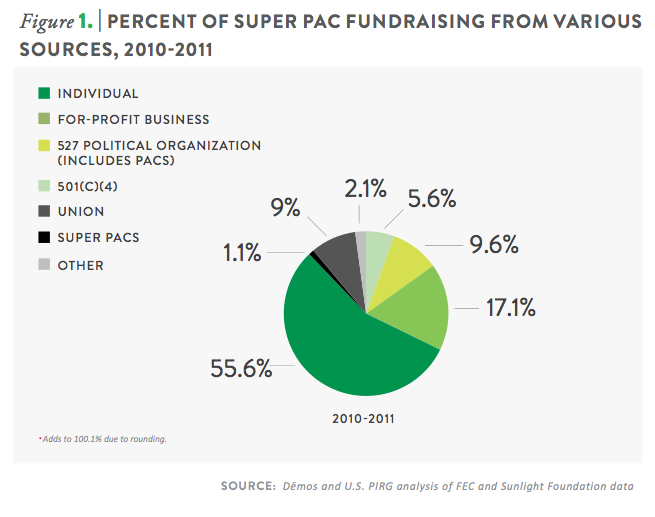Abolishing the 16th Amendment Income Tax & IRS may be a ways off for right now. But, the IRS chartering of privileged groups and foundations for special tax favor with the non-profit tax-exempt chartering should get top billing for elimination right NOW!


But, Super PACs have provided an avenue for secret money to influence elections.


The presidential race had barely gotten off the ground when it became clear that 2012 would be the year of the Super PAC. The millions of dollars raised and spent by these strange and powerful court-created entities have created a kind of parallel campaign.
Super PACs represent much of what is wrong with American democracy rolled neatly into one package. They are tools that powerful special interests and a tiny privileged minority can use to work their will by drowning out the voices of ordinary Americans in a sea of (sometimes secret) cash.
We do not yet have nearly the full picture of how Super PACs have affected and will continue to affect the 2012 elections. Right now, we only have a complete picture of the year 2011. But, we can already see some disturbing trends.
Demos and U.S. PIRG analysis of Federal Election Commission data on Super PACs from their advent in 2010 through the end of 2011 reveals the following:
- For-profit businesses use Super PACs as an avenue to influence federal elections. 17% of the itemized funds raised by Super PACs came from for-profit businesses—more than $30 million.
- Because Super PACs—unlike traditional PACs—may accept funds from nonprofits that are not required to disclose their donors, they provide a vehicle for secret funding of electoral campaigns. 6.4% of the itemized funds raised by Super PACs cannot be feasibly traced back to an original source.
- Super PACs are a tool used by wealthy individuals and institutions to dominate the political process. 93% of the itemized funds raised by Super PACs from individuals in 2011 came in contributions of at least $10,000, from just twenty-three out of every 10 million people in the U.S. population.
Scholarly and public opinion research demonstrates that big-money dominance of campaigns skews American politics because wealthy donors have different life experiences and policy preferences than average-earningcitizens. For example, a Russell Sage Foundation survey of high-earners conducted between February and June of 2011 revealed that:
- Wealthy respondents were nearly 2.5 times more likely than average Americans to list deficits as the most important problem facing our country.
- In spite of consistent majority public support for raising taxes on millionaires, among wealthy respondents, “[t]here was little sentiment for substantial tax increases on the wealthy or anyone else.”
- In spite of recent scandals on Wall Street, “more than two thirds of [survey] respondents said that the federal government ‘has gone too far in regulating business and the free enterprise system.”
BUSINESS MONEY
Democracy is a system for people of equal worth and dignity to make decisions about collective self-government. Elections are the most concrete locus of popular decision-making in a representative democracy.
Contrary to the Supreme Court’s Citizens United ruling, for-profit businesses should not be permitted to spend treasury funds to influence these elections. First, most businesses are constrained to participate only to maximize private profit, rather than out of regard for the public good. More important, this spending undermines political equality by allowing those who have achieved success in the economic sphere to translate this success directly into the political sphere.
Yet, Super PACs have provided a convenient avenue through which more than 566 for-profit businesses have contributed $31 million, accounting for 17% of total itemized Super PAC fundraising since their inception. For the year 2011, that figure was $17 million, for 18% of total itemized Super PAC fundraising (See Figure 1).
SECRET MONEY
In the otherwise controversial arena of campaign finance, there has been a near-consensus—across the political and ideological spectrum—regarding the benefits of robust disclosure of the sources and amounts of campaign funds.18 As noted above, the Supreme Court extolled these benefits in the very decision that laid the groundwork for Super PACs.19
But, Super PACs have provided an avenue for secret money to influence elections.
Our analysis of FEC data shows that 6.4% of the itemized funds raised by Super PACs since 2010 was “secret money,” not feasibly traceable to its original source. (See Figure 2.) That figure was just below 2.4% for the off-year of 2011.
Nearly 20% of active Super PACs20 received money from untraceable sources in 2011. Six out of the 10 Super PACs that raised the most money in 2011 received money from untraceable sources. (See Table 1.)
Without data for a complete election cycle, it is difficult to analyze the overall trend and effect of secret money. One reasonable hypothesis is that secret money will increase with proximity to an election. See Figure 3 for money-by-month analysis that provides some support for this supposition... Finish reading @Source

